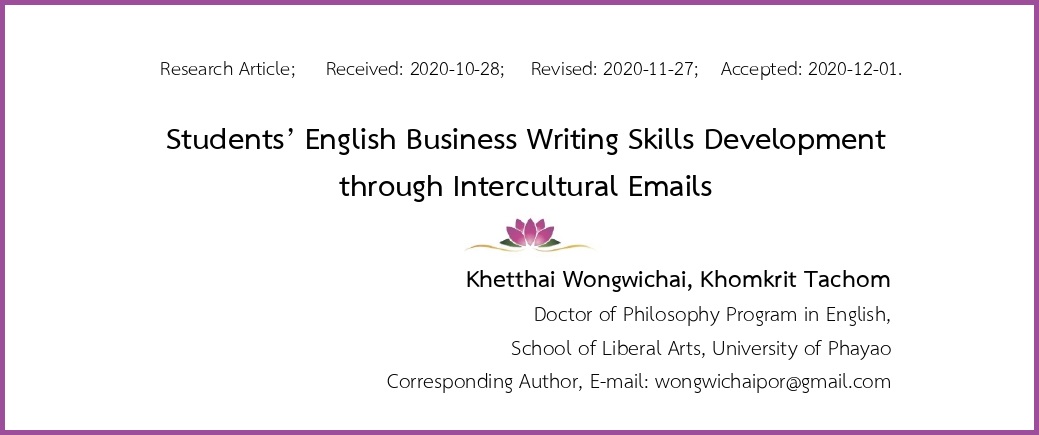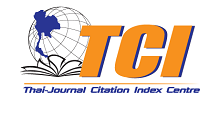Students’ English Business Writing Skills Development through Intercultural Emails
คำสำคัญ:
Intercultural Emails, Task-based Language Teaching (TBLT), Writing Tasks, Formal and Informal Word, Business Writingบทคัดย่อ
This paper examines the development of Thai EFL students’ English business writing proficiency through the use of intercultural email tasks adopted the idea of Task-based Language Teaching (TBLT) and collaborative learning for future business staff. The purposes of this quasi-experimental research are to 1) compare the effectiveness of student’s intercultural email writing between pre-test and post-test, and 2) examine the students’ vocabulary use in writing business emails compared between pre-test and post-test. The samples include 33 students enrolled in English for Business Communication 1 at the University of Phayao in 2019 academic year. The instruments were intercultural email tasks, pre-test, and post-test scores. The data was then analyzed using descriptive statistics, mean, standard deviation, and paired t-test for quantitative data.
The results of this study revealed that there was a significant difference of student’s intercultural email writing ability compared between pre-test and post-test at 0.01 significant levels. Furthermore, the students used more polite words in email writing for the post-test. The body of knowledge gained from the present study indicates that students can learn and practice intercultural email writing through TBLT.
Downloads
เอกสารอ้างอิง
Akhmad, Z. D., and Amiri, N. I. (2018). Analysis of Students’ Understanding in Using Formal and Informal Expression. Al-Lisan: Journal Bahasa (e-Journal). 3 (2), 94-103.
Bovée, C. L., et al. (2006). Business Communication Essentials, 2nd ed. New Jersey: Pearson Education Inc.
Bygate, M. (1996). Effects of Task Repetition: Appraising the Developing Language of Learners. In Willis, J. & Willis, D. (Eds.), Challenge and Change in Language Teaching. London: Heinemann.
Chaney, L. and Martin, J. (2004). Intercultural Business Communication, 3rd ed. New Jersey: Pearson Education Inc.
ejoy. (18 October 2018). The Most Effective Way to Write Inquiry Response Email. Retrieved November 10, 2019, from https://ejoy-english.com/blog/most-effective-inquiry-response-email/
engVid. (n.d.). Formal & Informal English. Retrieved September 18, 2020, from https://www.engvid.com/english-resource/formal-informal-english/
González, L. E. M., and Pinzón, M. M. L. (2019). The Impact of Task-based Language Teaching on Learners’ Writing Skills. Indonesian EFL Journal. 5 (2), 41-48. doi: 0.25134/ieflj.v5i2.1820.
Greenfield, R. (2003). Collaborative E-mail Exchange for Teaching Secondary ESL: A Case Study in Hong Kong. Language Learning & Technology. 7 (1), 46-70.
Hall, E. T. (1976). Beyond Culture. New York: Anchor Press/Doubleday.
Hooker, J. (2012). Cultural Differences in Business Communication. The Handbook of Intercultural Discourse and Communication. Chichester: Blackwell Publishing Ltd.
Liao, P. L., and Fu, K. (2014). Effects of Task Repetition on L2 Oral (in Written Form) Production in Computer-mediated Communication. International Journal of Humanities and Arts Computing. 8, 221-236. Doi: 10.3366/ijhac.2014.0109.
Malathong, P. (2016). Problems in Writing English Business Emails of Non-native Speaking Employees in an International Real Estate Service Company in Thailand. (Master’s Thesis). Thammasat University. Bangkok.
Naudhani, M., and Naudhani, S. (2017). The Impact of the Task Based Learning on the Teaching of Writing Skills of EFL Learners in Pakistan. ELK Asia Pacific Journal of Social Science. 3 (2), 1-17.
Paramita, A. and Ngadiman, A. (2014). Japanese Cultural Thought Patterns as Manifested in English Emails. Magister Scientiae. (35), 1-14.
Parisuthiman, S. (2013). Business Communication: A Functional Approach, 9th ed. Bangkok: Thammasat University Press.
Rcampus. (n.d.). iRubric: Formal Email Rubric. Retrieved April 17, 2020, from https://www.rcampus.com/rubricshowc.cfm?sp=yes&code=GXW5685&
RUBISTAR. (4 February 2013). Letter-writing: Email Etiquette. Retrieved November 9, 2019, from http://rubistar.4teachers.org/index.php?screen=ShowRubric&rubric_id=2282677&
Wei, X. (2017). Analyzing Thai Students’ Email Literacy at Tertiary Level, Thailand. Review of Integrative Business and Economics Research. 6 (4), 164-179.
Willis, J. (1996). A Framework for Task-based Learning. Harlow: Longman.






